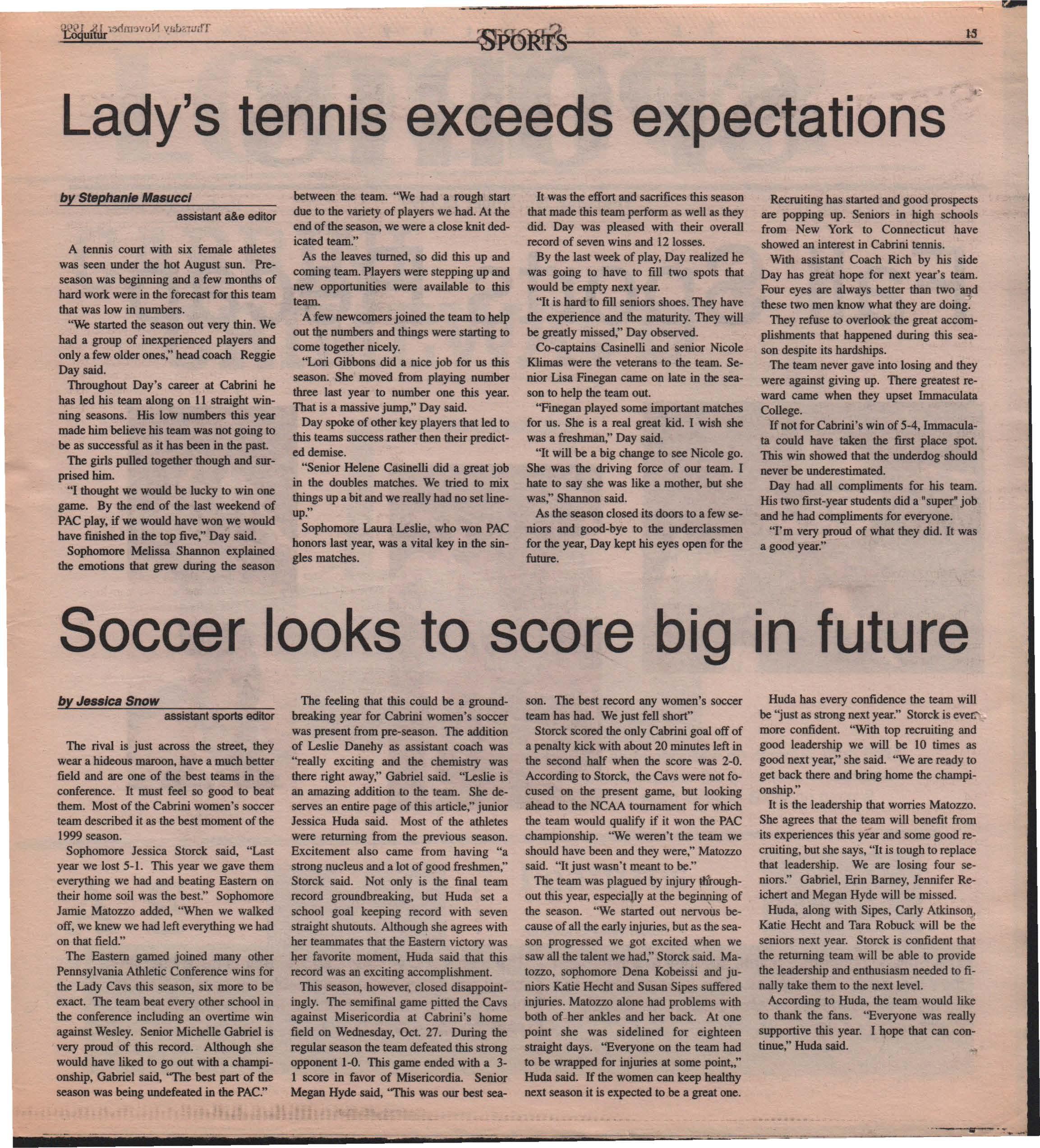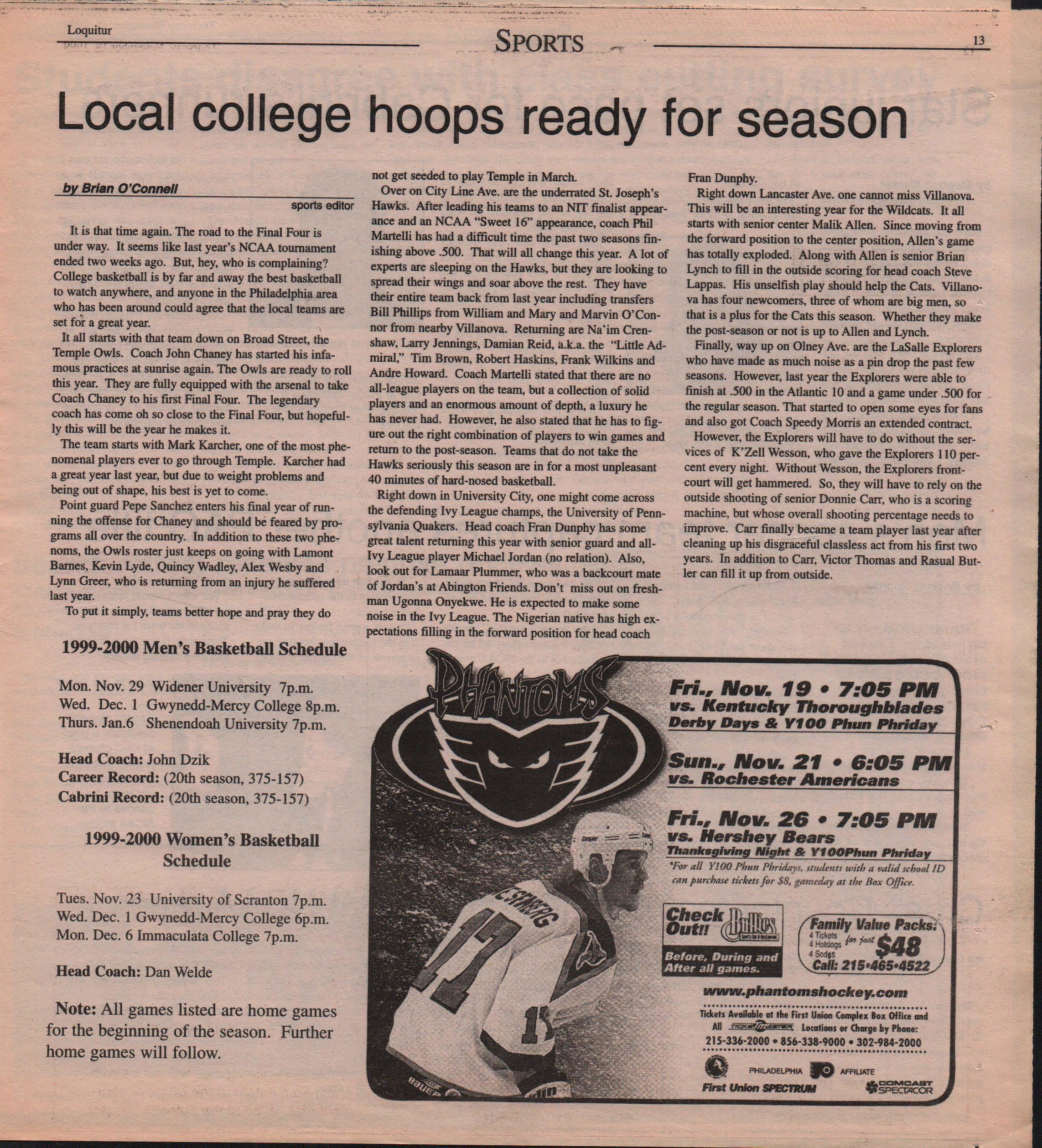
3 minute read
SJudents disagree with class cutting survey
by Chps Vesci assistant copy editor
A recent study conducted at the University of Kansas concluded that at least 25 percent of college class members are likely to be absent on any given day, and students enrolled in larger classes tend to cut more than those do in smaller classes.
Advertisement
Professors are stepping up their attendance patrols by employing sign in sheets,in-class quizzes and by counting attendance towards each student's final grade.
At Cabrini, "students are responsible for their own class attendance," according to the Student Handbook.
The handbook goes on to state that classes tend to be different in attendance expectations, but students should clear up any uncertainties by conferring with the class instructor.
"Short term absences" (one to three classes due to illness, funer- als, emergencies) should be reported to the professor, but longer absences should be reported to academic affairs.
Students are also liable for any class work missed on account of their absence.
Dr. Jonnie Guerra, vice president for academic affairs, said that her office issues a memorandum to all professors.
"It talks about the elements of a good syllabus, including clear explanation of an attendance policy," she said.
However, she adds that it is each faculty member's right to dictate his or her own attendance policy.
Guerra also states that in her sixteen years working as an educator, the "most important reason" a student gets in academic difficulty is because of missing class.
"If you want to be successful, you must go to class," she said.
Jenna Marquadt, a first-year student, describes herself as having "pretty good" attendance. Howev- er, she says, it is sometimes challenging to wake up for her 8: 15 a.m. math class. Marquadt also said that she finds the class too easy, which is another reason she contemplates skipping it.
Marquadt disagrees with one of the study's findings-that students in lower class levels skip more often than upperclassmen.
"Everyone skips sometimes-not just freshmen," she said.
However, she said that she is less likely to miss her Spanish class, since her professor regularly passes around a sign-in sheet.
Azeen Keramati, a junior and social work major, confesses that she saw a lull in her own class attendance during her sophomore year.
However, she thinks that the study's conclusion that 25 percent of a class is absent on any given day seems a bit "too high" for Cabrini's classes.
In addition, Keramati says she feels guilty skipping a small class,
Search retreat receives positive reviews
Thirty-seven participants attended the retreat, which is sponsored twice a year by the college's Campus Ministry department.
by Allison Webb staff writer
Spiritual and moving were two words used to describe Cabrini's Search retreat. The retreat was held this weekend at Appel Farm in Elmer, NJ.
Thirty-seven Cabrini students and team members loaded onto the buses Friday afternoon to head out to the farm for a captivating experience.
The retreat involved discussions, presentations, and activities. John DiMucci, campus minister, lead the group on this adventure.
''The Search retreat allows participants to get to know themselves, others and God;' DiMucci said.
The trip was run by the students and for the students. Nick Luchko, a junior, was one team member who attended the retreat. He described it as "the best thing on this campus.
"It makes an impact on a per- son's life. Everyone had a great experience and a great time," Luchko said.
Jenna Mancini, junior, also joined the retreat and had nothing but praise to give it.
"It was one of the best things I could have done for myself," she said. "It was about spirituality, yourself and what you make of it!' because her absence is noticeable by the professor.
Anyone who missed out on the Search retreat can attend the next one, which will be held during the spring semester.
Like Marquadt, certain factors tempt her to miss a class, such as a teacher who reads to the class directly from a textbook.
"It's the student's responsibility to go," she said. "We're paying so much, you might as well go."
One concern of educators in this information age is that students will post their notes on the Web after a class. Some companies even hire students to put notes on the Internet following a lecture.
A number of instructors at Cabrini offer a range of Internet sources.
Dr. Marilyn Johnson, a professor of English and cornrnunications, posts her entire syllabus on the web, as well as listings for Web pages on the particular topic her class is currently studying. For example, she posted the link to an old English site on her linguistic course's page.
However, she states that this in- formation is merely "a supplement" and does not make up for a missed class.
"I don't do lectures on the web, nor do I post class notes," she says. Johnson said that she often has quizzes in each class to ensure attendance.
Dr. Rocco Paolucci, chair of the information science and technology department, regularly posts his own lecture notes on the Internet for his students, citing that it allows for more discussion in class-students do not need to be distracted by writing every word down.
He contends that these notes are "not a substitute" and they are merely highlights of the lecture. Paolucci said that he hopes that the notes aid students who miss class for a legitimate reason.
Although he does not like students to skip his class, Paolucci said that he respects their choices. ''They're all adults," he said. 'That is their decision."








